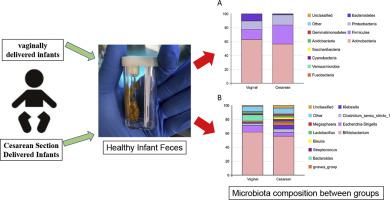Journal of Proteomics ( IF 3.3 ) Pub Date : 2020-12-08 , DOI: 10.1016/j.jprot.2020.104071 Na Li 1 , Shengnan Liang 1 , Qingxue Chen 1 , Lina Zhao 1 , Bailiang Li 1 , Guicheng Huo 1

|
Delivery mode is recognized as an important determinant of gut microbiota composition. Vaginally delivered infants were colonized by maternal vaginal and fecal microbiota, while those delivered by cesarean section were colonized by environmental microorganisms. To reveal differences induced by delivery mode, we determined fecal microbiota and fecal metabolome from 60 infants in Northeast China region. Bacterial gene sequence analysis showed that the feces of vaginally delivered infants had the highest abundance of Bifidobacterium, Lactobacillus, Bacteroides and Parabacteroides, while the feces of cesarean section delivered infants were more enriched in Klebsiella. LC-MS-based metabolomics data demonstrated that the feces of vaginally delivered infants were associated with high abundance of DL-norvaline and DL-citrulline, while the feces of cesarean section delivered infants were abundant in trans-vaccenic acid and cis-aconitic acid. Moreover, the feces of vaginally delivered infants was significantly in positive correlation with tryptophan metabolism and pyruvate metabolism, however, the feces of cesarean section delivered infants was positively correlated with ABC transporters. Collectively, our study demonstrated that gut microbiota and metabolite profiles were significantly different between vaginally delivered and cesarean section delivered infants, and provided the theoretical basis for restoring the intestinal environment of cesarean section infants birthed in the study region.
Significance
The intestinal microbiota and metabolites play important roles in infant development. To validate whether delivery modes influence the gut environment, we performed a detailed analysis of the earliest microbial colonization of the infant gut using a combination of 16S rRNA gene amplicon sequencing and LC-MS-based metabolomics. We found that the gut microbiota and metabolite composition were significantly different between vaginally delivered infants and cesarean section delivered infants. Our findings establish a vital baseline for studies tracking the infant gut microbiota and metabolite development following different delivery modes, and their associated effects on infant health. This study provides preliminary evidence that the observed differences due to delivery modes highlight their importance in shaping the early intestinal microbiota and metabolites.


























 京公网安备 11010802027423号
京公网安备 11010802027423号